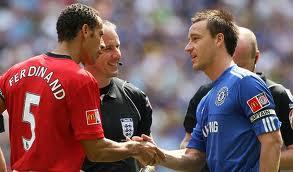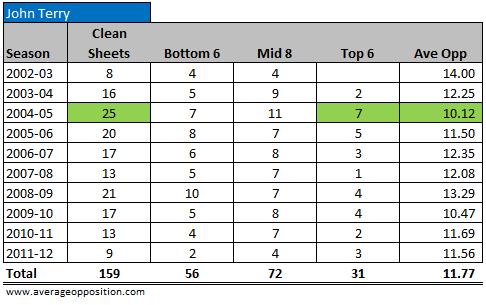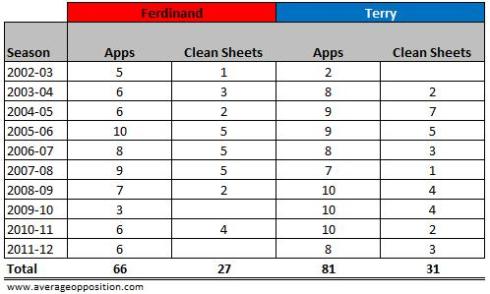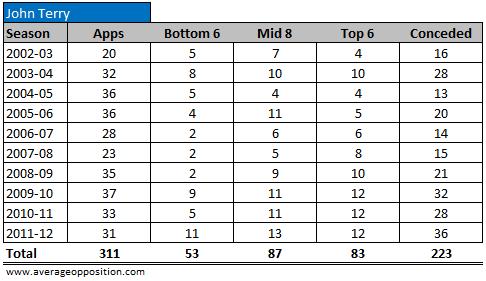Up next in the World Famous Player
Comparison series is a slightly controversial one. England defenders and
definitely not best friends, Rio Ferdinand and John Terry. Two of the best
defenders in Premier League history, this is the first comparison of defenders,
and could be the last depending on feedback….

Given the recent disharmony between Terry and the Ferdinands, this may
seem a bit on the reactive side, but I’ve had this request on more than one
occasion (twice) so thought I’d give it a go. Both are entering the twilight of
their careers (Rio has just turned is 34, JT, approaching 32), both have been
League winners and Champions League winners. Both have played at one of the
biggest clubs in the world for 10 years or more, and for a long time, the two
were playing alongside eachother at the heart of the England defence. With that
in mind, and the added spice of club and personality clashes/rivalries, they’re
ideal candidates to compare.
The Rules
Usually I’m comparing goals and assists, but in this instance the focus
is all about the dirty business of stopping them. So when looking at the range
and average opponent, it’ll be by goals conceded and clean sheets. The primary
focus will be on Premier League stats, but there will be a look at
international and cup games. The calculations can be found in the rules and
workings page on the top menu, but simply enough, it’s a look at their stats
but by the level of opposition.
The time period is from when Ferdinand signed for Manchester United at
the start of the 2002-03 season, up until the end of 2011-12 – 10 full seasons.
In that time, Terry has played 311 Premier League games to Ferdinand’s 269.
Background
Despite being born and bred in South London, Rio Ferdinand began his
Football career in the prestigious West Ham academy. Initially a central
midfielder, Rio was taught the art of defending under the tutelage of Tony
Carr, and was hailed as the heir to Bobby Moore’s throne for club and country.
With his ability on the ball, Ferdinand also played for the West Ham first team
in central midfield, wing back and even up front – scoring his first senior
goal in just his second substitute appearance, after his debut aged just 17.
Seen as talented but unfocused, eyebrows were raised when Leeds United paid
£18m for the young defender in November 2000 – both a British Record transfer
and also the World Record price for a defender. But Ferdinand excelled under
fellow Centre Back David O’Leary and helped a young Leeds team to the Semi
Final of the Champions League later that season. Another good season later, and
Ferdinand was starting for England in the 2002 World Cup, as they got to the
Quarter Finals. His displays for both Leeds and England were enough for Sir Alex
Ferguson to pay over £30m – making him once again the most expensive British
footballer, and regaining the title of World’s most expensive defender from
Lilian Thuram.
John Terry on the other hand, has been a one club man. Despite also
training with West Ham as a youngster, the Barking born defender signed for
Chelsea at the age of 14 after playing for famous boys club Senrab, along with
the likes of Bobby Zamora, Ledley King and JLloyd Samuel. During his early
years around the Chelsea first team squad, he saw his chances limited due to
Marcel Desailly and Frank Le Boeuf, and subsequently found himself at
Nottingham Forest on a short term loan to get first team experience under David
Platt. Despite making his Chelsea debut in the 1998-99 season, Terry didn’t
become a first team regular until the 2000-01 season, playing 22 league games
as Chelsea finished in 6th place. The following season, Terry further cemented
his place as a first team regular, playing in 33 of the 38 league games, as
Chelsea once again finished in 6th place. Seen as a typical British defender,
Terry made a reputation for putting his body on the line for the cause, but it
his ability to pass the ball was often overlooked as a result.
Premier League
Clean
Sheets
And so on to the hard numbers. First and foremost, the appearances and
clean sheets by season:

Both have pretty good records with close to a one in two clean sheet
rate. Ferdinand’s appearances have been slightly limited due to injury and an
eight month ban for forgetfulness. Over the ten years, Ferdinand has made an
average of 27 league appearances per season, and in that time, has kept an
average of 12.9 clean sheets per season. In total, he’s kept a clean sheet for
every 2.085 games. John Terry’s 311 appearances work out at an average of 31
games per season, with a clean sheet rate of 15.9. So on the face of it, Terry
is ahead, with a clean sheet every 1.955 games.
Terry’s high of 25 in Chelsea’s title winning season of 2004-05 dwarfs
Ferdinand’s 19 in 2007-08, when United won the total. In fact, Terry has kept
20 clean sheets or more in three of the ten seasons. Surprisingly, neither
player has completed a full 38 game season.
So Terry’s ahead on the overall defensive stats, but in reality, both
keep a clean sheet every second game – a phenomenal rate over a ten year
period. But what of their quality of the opposition? Step this way.

First up (due to age and alphabet) is Ferdinand. A decent 27 clean
sheets against the teams that finished in the Top 6, 65 against the Mid table
teams and 37 against the teams struggling against relegation. An average ranked
opponent of 11.21 over 129 clean sheets, his highest number of clean sheets
against the big teams was five, which was achieved in three consecutive seasons
between 2005-06 to 2007-08, with Man Utd winning the league in the latter two
seasons. His highest average was in 2010-11, with 7.50 average from his eight
clean sheets – of which, half were against the Top 6 teams, with Spurs (twice),
Arsenal and Man City all being kept out. Tellingly, no clean sheets were kept
against the Top 6 in the 2011-12 season as United lost the title on goal
difference, with Ferdinand being part of the United team that lost 6-1 at home
to Manchester City.

Terry’s best season was by far and away
the 2004-05 season. Keeping a whopping 25 clean sheets against an average
ranked opponent of 10.12 as Chelsea went on to win the league for the first
time in 50 years, breaking, posting the best defensive record in the history of
the English top flight. The season after also saw a stellar defensive display
from Chelsea, and Terry was partly responsible for 20 clean sheets, including
five against the Top 6 teams. Last season however, saw a drop in the number of
clean sheets as he posted just 9 during his 31 league appearances. This could
be down to a number of things, such as off the field problems, or defensive
partners. Long gone are the days of Carvalho, who has been replaced by Luiz and
Cahill. As a result, the number of clean sheets have dropped significantly.
So John Terry is more likely to play first and foremost, and he’s just
ahead of Rio Ferdinand in terms of games per clean sheet. But……
If we take a closer look at Clean Sheets against the Top 6, taking into
account Ferdinand’s appearances. Each player has finished in the Top 6 in each
of the ten seasons, meaning there’s a maximum of ten appearances against Top 6
opposition. So here’s the clean sheets and appearances by player versus the
best in the league:

John Terry’s clean sheet rate of one every 1.955 games becomes a clean
sheet every 2.61 games, compared to Ferdinand’s clean sheet every 2.44 games.
So Terry’s more likely to keep clean sheets overall, but Ferdinand did it more
against the best in the league. In United’s last title winning season, he kept
an impressive four in just six appearances.
Goals
Conceded
Moving on to goals conceded. First up is Ferdinand again. Over the 269
Premier League games for United in the last 10 years, he’s let in on average
0.75 goals per game – comfortably under the magical 1 per game target. His best
season, being the 2007-08 title win, where he let in only 21 goals in 35 games
– 0.6 goals per game. The season before, he played 8 games versus the Top 6
teams, and only conceded 4 goals, whilst in 2010-11, the other Top teams only
managed to score twice during his 6 games against. In total, he conceded 70
goals in 66 apearances against the best teams in the league – a number damaged
by the 6-1 Manchester Derby.

Moving on to Chelsea’s Captain, on the same comparison, Terry conceded
83 goals in 81 appearances against fellow Top 6 teams – just ahead of
Ferdinand’s rate. His best season against the Top 6 was in 2004-05 when just
four strikes got past him and his team mates in 9 appearances. His overall
goals conceded rate is 0.72 per game – almost identical to his rival’s 0.75.
His best season was the phenomenal 2004-05 when just 13 goals were conceded on
Terry’s watch – a phenomenal 0.36 goals per game. No wonder they won the league
so comfortably.

Discipline
This isn’t taking into account the many off the field issues affecting
each player, but a very quick look at the yellow/red card count in their last
ten years. It’s fair to say that the records are like Chalk and Cheese in this
regard. In just the Premier League games, they’ve shared 5 Red Cards – 4 of
which were for Terry. Reds against Spurs (twice), Everton and Man City have
cost his team as they managed just one win in the four games. Ferdinand’s one
red was in the 4-3 defeat to Blackburn, that saw young up and coming midfielder
David Bentley score a hat trick against United. A platform for great things…..
On the yellow cards, it’s pretty much the same story – Terry has 52 to
Ferdinand’s 20 in what is in keeping with the general expectation of the
players – Terry seen as a British Bulldog, win at all costs type, with
Ferdinand seen as the cultured type. In all competitions, for club and country
over the 10 years we’re looking at, it’s 31 yellows and 1 red for Ferdinand,
and 80 yellows and 5 reds for John Terry, with the last Red costing him a place
in the Champions League Final – not that he missed the celebrations.
Goals
One area where there really is no contest is at the other end of the
pitch. Whilst Ferdinand scored 7 Manchester United goals in the ten years we’re
looking at, John Terry scored a massive 43 in the same period. Whilst it has
nothing to do with who is a better defender (Philippe Albert anyone?), it’s
certainly an interesting angle, and some could use it when looking at the all
round footballers. Terry can point to goals against Roma, Arsenal, Man City and
Barcelona in recent years, whilst Ferdinand’s highlights in front of goal would
be scoring against Liverpool in back to back seasons.
Champions League
Of course, both players have Champions League medals and both have
tasted defeat in the final, so it’s worth comparing their records in Europe –
both at a group stage and a knock out stage – where in theory, the opposition
are better.
Once again, Terry leads the way with the overall number of clean sheets –
posting 39 against Ferdinand’s 36, however, when you take into account the
number of games, then Ferdinand has the fewer number of games per clean sheet
at 1.94 from 70 appearances compared to Terry’s clean sheets every 2.23 games
from his 87 appearances.
Champions League break down:

So in keeping with the Premier League stats, Ferdinand is more likely to
keep a clean sheet in the bigger games. Terry has kept a clean sheet for every
1.7 group games in the Champions League, but just one every 3.42 in the knock
out stages. Ferdinand on the other hand is pretty consistent – averaging a
clean sheet every two games regardless of the stage.
Other big games
Both players have played in three league cup finals. Ferdinand has two
medals, keeping clean sheets in two games, and conceding two goals in the three
games, whilst Terry’s three finals have seen five goals conceded, and one win.
Moving on to the FA Cup, Ferdinand has played in two FA Cup finals – keeping a
clean sheet before losing on penalties to Arsenal in 2005, and the equally
thrilling 1-0 defeat to Chelsea in 2007. Surprisingly, after ten years at Old
Trafford, he doesn’t have an FA Cup winners medal (he was suspended when
Millwall were beaten in 2004). Terry on the other hand has four winners medals in
that time (to add to his 99-00 one), keeping clean sheets against Portsmouth
(2008) and Man Utd in the aforementioned snorefest. Two 2-1 victories over both
Merseyside clubs completed the set. So Ferdinand has three clean sheets in five
domestic Cup Finals to Terry’s two in seven.
England
 So we’ve established that both are
great defenders in their own right, but how we’re they together, and did they
fair better with or without each other for England? Ferdinand won the first of
his 81 caps in 1997 as a teenager, and even made it to the World Cup the
following year as a non playing squad member. Terry would have to wait another
five seasons for his first cap, and up until his recent international
retirement, made 78 appearances for the Three Lions.
So we’ve established that both are
great defenders in their own right, but how we’re they together, and did they
fair better with or without each other for England? Ferdinand won the first of
his 81 caps in 1997 as a teenager, and even made it to the World Cup the
following year as a non playing squad member. Terry would have to wait another
five seasons for his first cap, and up until his recent international
retirement, made 78 appearances for the Three Lions.
In the last ten years, Ferdinand’s made 59 appearances to Terry’s 72 –
playing alongside eachother on 34 occasions:

In terms of clean sheets, there wasn’t really much difference. Together
they kept a clean sheet every 2.20 games, Ferdinand without Terry was 2.27 and
Terry without Ferdinand was 2.17 – a slight edge to Terry. In terms of goals
conceded, together they let in 0.82 goals per game, with Ferdinand keeping a
slightly better 0.8 conceded without Terry and Terry keeping a consistent 0.82.
Once again, there’s not a great deal in it. In terms of highlights,
Terry’s clean sheet against Italy in Euro 2012, compares with Ferdinand’s clean
sheet against Argentina in the 2002 World Cup. In terms of goals, it’s a bit
closer than their club appearances, with Ferdinand scoring three goals for
England compared to Terry’s six. Interestingly though, all of Ferdinand’s have
been in competitive matches, with five of Terry’s six being in friendlies
(including Brazil and Germany).
The Makelele Factor
It’s hard to put an exact impact to the Chelsea clean sheets that John
Terry kept, but from 2003-04 to 2007-08 Claude Makelele played the holding
midfield role so well that it was renamed the Makelele role. During that time,
John Terry kept 91 of his 159 clean sheets, keeping 68 in the five seasons
without him. Ferdinand meanwhile had Roy Keane for his first three seasons at
the club with his best defensive performances coming after the departure of the
influential skipper. And it’s fair to say that he wasn’t quite as defensively disciplined
as Makelele.
Conclusion
Shock Horror, I’m going to declare this one a draw. Terry was slightly
more likely to keep a clean sheet, but Ferdinand was slightly more likely to do
so against the best opponents. In the big games, Ferdinand had the edge in
terms of both clean sheets and goals conceded (such as domestic Cup Finals and
European knock out games) but Terry was much more likely to trouble the
opposition by scoring. Looking at their England records, it was near identical
with and without each other. There was only ever going to be one conclusion
based on the stats.
So despite your view of each player as a person, no one can honestly say
that they haven’t both been excellent players – perhaps two of the best in
English history. Both are coming to the end of their careers now, but for those
ten years, there are very few who can compare.
Cheers,
Liam

Pretty much a draw?Are you kidding me?smh.
ReplyDeleteWhat in God's name is the Makelele factor?how can you factor that into JT's performances when you totally ignore the various players that have aided Ferdinand's.
You do a pretty good job of collating data, then ruin it by sitting on the fence. The stats clearly favour JT and there's that massive difference in the influence on proceedings at the other end.
You should be brave enough to declare winners,all these tepid,unfair draws leave a rather cloying taste in the mouth..
Hi Asaah - Terry was more likely to keep a clean sheet, but Ferdinand was more likely to do it in the bigger games - the whole idea of this blog is to identify the big game players.
DeleteWhilst there's a lot of draws, there are also clear winners - Henry vs van Nistelrooy was a clear win for the Frenchman, Messi won the battle of the Barcelona stars, and Drogba beat Gomez (on the old blog - haven't copied it over). The ones that finished in draws a justiable by content.
All opinions are welcome, but my opinion on the above is that given the measures, a draw is a fair result.
And on Makelele, I did look into the "defensive midfielders" that Ferdinand had in front of him, and there was no one that would sit in front of the back four like Makelele. He scored one goal in his Chelsea career - a rebound from his own penalty. He rarely passed the half way line, and he was brilliant at his job.
Delete